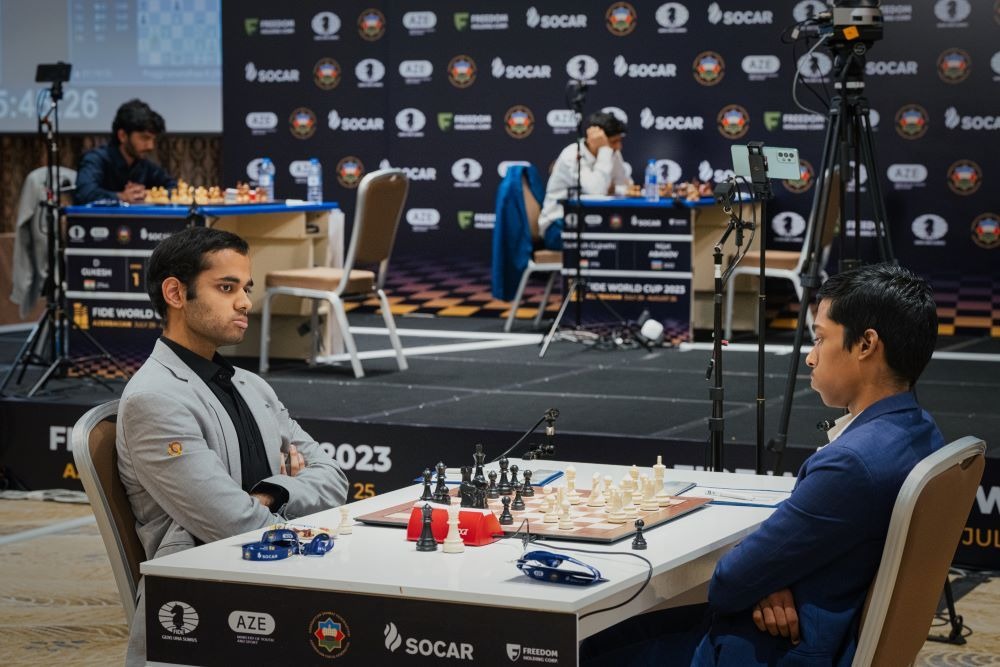
Until recently, there used to be a perception about Indian chess players. The world raved over the country’s talent pool, the growing list of Grandmasters (GM) and its steadily enhancing stature in the world of 64 squares.
Everybody spoke highly of the youngsters, who kept lowering the bar in terms of age while attaining GM titles. Yet, Indians have not made a major mark in world events at the senior men’s level after Viswanathan Anand.
Generally speaking, the Indians were perfect examples of gentleman losers. Barring Anand, the five-time former world champion and World No. 1, India as a team or Indians as individuals did not make serious inroads. They were talented and well behaved, but not the ones tipped to win messy affairs. The politically correct and those genuinely impressed still heaped praise on the Indians.
The first sign of change — bronze at the 2014 Chess Olympiad — did not create ripples. Even a gold and bronze in the Olympiads held online in 2020 and 2021 did not make much impact. But these indicated that things were on track.
As pointed out by Srinath Narayanan, coach of Arjun Erigaisi who is taking part in the chess World Cup in Azerbaijan, the real change was seen in last year’s Olympiad in Chennai, where Indians won team gold and a flurry of individual medals. Four quarterfinalists in the World Cup is another instance of showing that they can punch above their weight.
Also Read: How Global Chess League aspires to fast-forward growth of the game in India
Krishnan Sasikiran, who spent a long time in the top-20/30s with a best rankings of 21, feels technology has played a part in fast-tracking the likes of Arjun, R Praggnanandhaa and D Gukesh, who with Vidit Gujrathi, made the last eight.
“These players worked with strong computers from a young age,” said Sasikiran, the 42 year old who has been part of Anand’s team of ‘seconds’ in a few World Championship matches. “I’m not saying that makes it easier, but learning becomes faster. There were things which took me five years. Computers offer the solution in five minutes and there you go!
“They learn differently and have the solutions at their fingertips. Of course it takes years of dedication and guidance. But once they learn it, you can see their ‘fearless’ approach on the board. The computer makes impossible things simple. You see more risk-taking. That’s why these players prepare differently from what used to be. The mindset has changed.”
This is also a generation which benefited from initiatives like having Vladimir Kramnik, former world champion, and Boris Gelfand, world championship challenger, in Chennai for a coaching session for upcoming players. In Tamil Nadu especially, there are corporate entities supporting such efforts.
Sasikiran thinks that in hindsight, the Covid-19 pandemic worked in favour of the Indian players. “Because there were no tournaments to begin with and only a handful online afterwards, our players got a chance to prepare extensively,” he said. “In chess, it’s possible to sit at home and do constructive work. You can see the difference from the results after that.”
A member of the bronze-winning Chess Olympiad team of 2014, Sasikiran believes this generation has also gained from interacting with big names in their formative years. “Some of them worked with Anand, and some got to learn from Kramnik and Gelfand. The exposure level has changed. Confidence and not getting overawed are reflections of these things.”
If not anything else, this World Cup is expected to change the way Indian players are perceived. They are talented and well behaved as before, better prepared than before and willingly or unwillingly, out there to show that gentlemen can be fierce competitors.
Also Read: The IPL Moment for Chess and Embracing the New Generation of Indian Talent: Magnus Carlsen Exclusive



